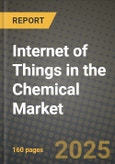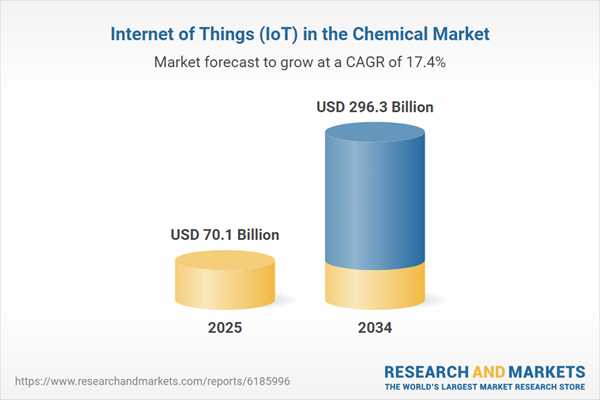The Internet of Things (IoT) in the Chemical Market is transforming traditional manufacturing into smart chemical production by leveraging connected devices, real-time monitoring, and data-driven automation. IoT solutions enable chemical manufacturers to track temperature, pressure, flow rates, energy usage, and equipment performance across production lines and storage facilities. These insights allow for predictive maintenance, improved asset utilization, and compliance with stringent safety and environmental regulations. Smart sensors, automated valves, and cloud-based dashboards are integrated across refineries, specialty chemical plants, and storage terminals to increase visibility and reduce operational risks. As the chemical industry moves toward digitalization, IoT is becoming essential for enhancing productivity, reducing downtime, and ensuring product quality. The technology also plays a crucial role in tracking emissions, enabling companies to meet ESG targets and adopt more sustainable practices in real-time operational workflows.
The IoT in chemical market saw increased deployment of predictive analytics platforms and digital twins. Companies like BASF, Dow, and Linde expanded IoT implementation across continuous and batch processing facilities to reduce unplanned outages and optimize resource usage. Smart field instruments monitored critical parameters, while edge computing enabled localized processing of time-sensitive data for quicker decision-making. Regulatory pressures pushed the adoption of IoT for emissions tracking and hazardous chemical management. Integrated platforms allowed plant managers to visualize operational data from multiple locations, enhancing remote diagnostics and centralized decision-making. Supply chain disruptions led chemical companies to adopt connected inventory systems and RFID-enabled warehouse tracking. Collaborative robots (cobots) with IoT connectivity were introduced in hazardous zones to minimize human exposure. These developments aligned with Industry 4.0 roadmaps, enabling chemical companies to shift from reactive to proactive operational strategies.
The IoT in the chemical sector will expand further through AI-assisted process optimization, autonomous control systems, and blockchain-enabled supply chain verification. Plants will rely on machine learning to adjust process variables in real time, improving yield and reducing energy consumption. Autonomous drones and robotic inspectors equipped with IoT sensors will monitor pipelines and storage tanks, reducing inspection time and enhancing safety. Blockchain paired with IoT will be used to verify raw material origin, quality, and chain-of-custody, increasing transparency in high-risk chemical supply chains. Chemical companies will adopt more modular and mobile production units supported by IoT to meet decentralized manufacturing needs. Environmental sensors will play a larger role in real-time compliance and ESG reporting. As the industry confronts tighter regulations, skilled labor shortages, and volatile feedstock costs, IoT will be a critical enabler of operational resilience and digital maturity in the global chemical value chain.
Key Insights: Internet Of Things (IoT) In The Chemical Market
- The analyst notes the increasing use of digital twins in chemical plants, allowing operators to simulate and optimize complex processes using real-time IoT data, reducing trial-and-error in high-risk production environments.
- Edge computing is trending, enabling real-time processing of safety-critical data from reactors, valves, and compressors without latency or cloud dependency, particularly in hazardous chemical zones, says the analyst.
- According to the analyst, emissions monitoring through IoT sensors is rising as chemical companies strive for transparency and compliance with tightening environmental regulations across the globe.
- The analyst highlights the adoption of cobots equipped with IoT integration in chemical plants, reducing human exposure to hazardous processes while improving throughput and operational consistency.
- Blockchain and IoT are converging in chemical logistics, offering tamper-proof traceability and improving inventory visibility across supply chains, especially for dangerous goods and regulated compounds.
- The analyst points to rising energy and raw material costs as a key driver, pushing chemical manufacturers to use IoT for energy optimization and reducing input wastage through automated process control.
- Stricter safety and environmental regulations are encouraging the use of IoT in emissions control, hazardous waste tracking, and plant safety monitoring, according to the analyst.
- The analyst notes growing pressure on chemical companies to modernize operations as part of broader digital transformation strategies in line with Industry 4.0 and ESG commitments.
- The need for remote operations and minimal human intervention - especially in hazardous environments - is accelerating investment in IoT-enabled robotics and remote diagnostics, says the analyst.
- The analyst highlights cybersecurity risks as a key concern, as connected chemical systems could become targets for industrial sabotage or data breaches if not properly secured.
- According to the analyst, legacy infrastructure and outdated control systems pose integration challenges for IoT deployment, especially in older plants not originally designed for digital connectivity.
Internet Of Things (IoT) In The Chemical Market Segmentation
By Technology Type
- Machine Vision
- 3D Printing
- Manufacturing Execution Systems
- Distributed Control Systems
- Industrial Robotics
- Big Data
- Artificial Intelligence
- Augmented Reality and Virtual Reality
- Other Technologies
By Industry
- Large Enterprises
- Small and Medium-Sized Enterprises
By End User
- Metals and Mining
- Food and Beverages
- Chemical
- Pharmaceutical
- Pulp and Paper
Key Companies Analysed
- Microsoft Corporation
- BASF SE
- Huawei Technologies Co. Ltd.
- Hitachi Ltd.
- Siemens AG
- General Electric Company (GE)
- Intel Corporation
- The International Business Machines Corporation
- Cisco Systems Inc.
- Mitsubishi Electric Corporation
- Schneider Electric SE
- Honeywell International Inc.
- Air Liquide S.A.
- SAP SE
- ABB Ltd
- Hewlett Packard Enterprise Development LP
- Nokia Corporation
- Johnson Controls International
- Emerson Electric Co.
- Atos SE
- Rockwell Automation Inc.
- FANUC Corporation
- Yokogawa Electric Corporation
- PTC Inc.
- Cognite AS
- Seeq Corporation
- Appshare Technologies Inc.
- Altizon Inc.
- SumatoSoft
- Davra Network Limited
Internet Of Things (IoT) In The Chemical Market Analytics
The report employs rigorous tools, including Porter’s Five Forces, value chain mapping, and scenario-based modeling, to assess supply-demand dynamics. Cross-sector influences from parent, derived, and substitute markets are evaluated to identify risks and opportunities. Trade and pricing analytics provide an up-to-date view of international flows, including leading exporters, importers, and regional price trends.Macroeconomic indicators, policy frameworks such as carbon pricing and energy security strategies, and evolving consumer behavior are considered in forecasting scenarios. Recent deal flows, partnerships, and technology innovations are incorporated to assess their impact on future market performance.
Internet Of Things (IoT) In The Chemical Market Competitive Intelligence
The competitive landscape is mapped through proprietary frameworks, profiling leading companies with details on business models, product portfolios, financial performance, and strategic initiatives. Key developments such as mergers & acquisitions, technology collaborations, investment inflows, and regional expansions are analyzed for their competitive impact. The report also identifies emerging players and innovative startups contributing to market disruption.Regional insights highlight the most promising investment destinations, regulatory landscapes, and evolving partnerships across energy and industrial corridors.
Countries Covered
- North America - Internet Of Things (IoT) In The Chemical market data and outlook to 2034
- United States
- Canada
- Mexico
- Europe - Internet Of Things (IoT) In The Chemical market data and outlook to 2034
- Germany
- United Kingdom
- France
- Italy
- Spain
- BeNeLux
- Russia
- Sweden
- Asia-Pacific - Internet Of Things (IoT) In The Chemical market data and outlook to 2034
- China
- Japan
- India
- South Korea
- Australia
- Indonesia
- Malaysia
- Vietnam
- Middle East and Africa - Internet Of Things (IoT) In The Chemical market data and outlook to 2034
- Saudi Arabia
- South Africa
- Iran
- UAE
- Egypt
- South and Central America - Internet Of Things (IoT) In The Chemical market data and outlook to 2034
- Brazil
- Argentina
- Chile
- Peru
Research Methodology
This study combines primary inputs from industry experts across the Internet Of Things (IoT) In The Chemical value chain with secondary data from associations, government publications, trade databases, and company disclosures. Proprietary modeling techniques, including data triangulation, statistical correlation, and scenario planning, are applied to deliver reliable market sizing and forecasting.Key Questions Addressed
- What is the current and forecast market size of the Internet Of Things (IoT) In The Chemical industry at global, regional, and country levels?
- Which types, applications, and technologies present the highest growth potential?
- How are supply chains adapting to geopolitical and economic shocks?
- What role do policy frameworks, trade flows, and sustainability targets play in shaping demand?
- Who are the leading players, and how are their strategies evolving in the face of global uncertainty?
- Which regional “hotspots” and customer segments will outpace the market, and what go-to-market and partnership models best support entry and expansion?
- Where are the most investable opportunities - across technology roadmaps, sustainability-linked innovation, and M&A - and what is the best segment to invest over the next 3-5 years?
Your Key Takeaways from the Internet Of Things (IoT) In The Chemical Market Report
- Global Internet Of Things (IoT) In The Chemical market size and growth projections (CAGR), 2024-2034
- Impact of Russia-Ukraine, Israel-Palestine, and Hamas conflicts on Internet Of Things (IoT) In The Chemical trade, costs, and supply chains
- Internet Of Things (IoT) In The Chemical market size, share, and outlook across 5 regions and 27 countries, 2023-2034
- Internet Of Things (IoT) In The Chemical market size, CAGR, and market share of key products, applications, and end-user verticals, 2023-2034
- Short- and long-term Internet Of Things (IoT) In The Chemical market trends, drivers, restraints, and opportunities
- Porter’s Five Forces analysis, technological developments, and Internet Of Things (IoT) In The Chemical supply chain analysis
- Internet Of Things (IoT) In The Chemical trade analysis, Internet Of Things (IoT) In The Chemical market price analysis, and Internet Of Things (IoT) In The Chemical supply/demand dynamics
- Profiles of 5 leading companies - overview, key strategies, financials, and products
- Latest Internet Of Things (IoT) In The Chemical market news and developments
Additional Support
With the purchase of this report, you will receive:- An updated PDF report and an MS Excel data workbook containing all market tables and figures for easy analysis.
- 7-day post-sale analyst support for clarifications and in-scope supplementary data, ensuring the deliverable aligns precisely with your requirements.
- Complimentary report update to incorporate the latest available data and the impact of recent market developments.
This product will be delivered within 1-3 business days.
Table of Contents
Companies Mentioned
- Microsoft Corporation
- BASF SE
- Huawei Technologies Co. Ltd.
- Hitachi Ltd.
- Siemens AG
- General Electric Company (GE)
- Intel Corporation
- The International Business Machines Corporation
- Cisco Systems Inc.
- Mitsubishi Electric Corporation
- Schneider Electric SE
- Honeywell International Inc.
- Air Liquide S.A.
- SAP SE
- ABB Ltd.
- Hewlett Packard Enterprise Development LP
- Nokia Corporation
- Johnson Controls International
- Emerson Electric Co.
- Atos SE
- Rockwell Automation Inc.
- FANUC Corporation
- Yokogawa Electric Corporation
- PTC Inc.
- Cognite AS
- Seeq Corporation
- Appshare Technologies Inc.
- Altizon Inc.
- SumatoSoft
- Davra Network Limited
Table Information
| Report Attribute | Details |
|---|---|
| No. of Pages | 160 |
| Published | October 2025 |
| Forecast Period | 2025 - 2034 |
| Estimated Market Value ( USD | $ 70.1 Billion |
| Forecasted Market Value ( USD | $ 296.3 Billion |
| Compound Annual Growth Rate | 17.3% |
| Regions Covered | Global |
| No. of Companies Mentioned | 30 |









